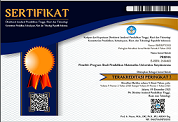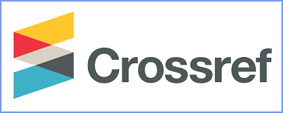ANALISIS KESULITAN BELAJAR MATEMATIKA DISKRIT MAHASISWA TEKNIK INFORMATIKA
Abstract
ABSTRACT
Asosiasi Perguruan Tinggi Informatika dan Komputer (APTIKOM) states that learning outcomes of Informatics on mathematical topics are discrete mathematics. This study aims to examine the results of students learning discrete mathematics, and examine what factors are causing students difficulty learning discrete mathematics. The method used is a mix method which is qualitative methods and quantitative methods. Data collection as the result of discrete mathematics learning outcomes, and mathematical learning difficulty questionnaire data. The population used is students of Informatics at Buana Perjuangan University Karawang with a sample of 65 students taking discrete mathematics courses in the 2018/2019 school year. The results showed that most students still had difficulty learning discrete mathematics. This is because an average value is 66,4 from the value of a test value is 55. This Test Value is the minimum passing grade. While the factors that cause discrete mathematics learning difficulties are divided into 2 classifications namely 6 influential indicators and 2 quite influential indicators.
Â
Keyword: Learning Difficulties, Learning Outcomes, Discrete MathematicsFull Text:
PDFReferences
Abdurrahman, Mulyono. (2012). Anak Berkesulitan Belajar: Teori, Diagnosis, dan Remediasinya. Jakarta: Rineka Cipta.
Anggriani, A., & Septian, A. (2019). Peningkatan Kemampuan Komunikasi Matematis dan Kebiasaan Berpikir Siswa Melalui Model Pembelajaran IMPROVE. IndoMath: Indonesia Mathematics Education, 2(2), 105-116. https://doi.org/10.30738/indomath.v2i2.4550
Arikunto, S. (2009). Dasar-Dasar Evaluasi Pendidikan. Edisi Revisi Cet IX. Jakarta: Bumi Aksara.
Hamalik, Oemar. (2001). Proses Belajar Mengajar. Jakarta: Bumi Aksara
Hendriana, H. dan Utari S. (2014). Penilaian Pembelajaran Matematika. Bandung: Refika Aditama.
Junaedi, I., Amin S., Endang S., & Chin Kin Eng. (2015). Disclosure Causes of Students Error in Resolving Discrete Mathematics Problems Based on NEA as A Means of Enhancing Creativity. International Journal of Education. 7 (4), 31-42. Retrieved from http://dx.doi.org/10.5296/ije.v7i4.8462
Martin, Nancy L. (2015). IT0: Discrete Math and Programming Logic Topics as a Hybrid Alternative to CS0. Information Systems Education Journal (ISEDJ) 13 (1), 30-44. Retrieved from https://files.eric.ed.gov/fulltext/EJ1137190.pdf
Levin, Oscar. (2019). Discrete Mathematics an Open Introduction. Creative Commons Attribution-Share Alike 4.0 International License. Corolado-Greeley. Retrieved from http://discrete.openmathbooks.org/pdfs/dmoi-tablet.pdf
Mutakin, Tatan Zenal. (2015). Analisis Kesulitan Belajar Kalkulus 1 Mahasiswa Teknik Informatika. Jurnal Formatif: Jurnal Ilmiah Pendidikan MIPA. 3 (1), 49-60.
Riduwan. (2005). Skala Pengukuran Variabel-variabel Penelitian. Bandung: Alfabeta.
Septian, A. (2017). PENERAPAN GEOGEBRA UNTUK MENINGKATKAN KEMAMPUAN PEMECAHAN MASALAH MATEMATIS MAHASISWA PROGRAM STUDI PENDIDIKAN MATEMATIKA UNIVERSITAS SURYAKANCANA. PRISMA, 6(2). https://doi.org/10.35194/jp.v6i2.212
Slameto. (2013). Belajar dan Faktor-Faktor yang Mempengaruhinya. Jakarta: PT.Rineka Cipta.
Sudijono, Anas. (2001). Pengantar Evaluasi Pendidikan. Jakarta: Raja Grafindo Persada.
Sugiharni, Gusti Ayu Dessy. (2018). Pengembangan Modul Matematika Diskrit Berbentuk Digital Dengan Pola Pendistribusian Asynchronous Menggunakan Teknologi Open Source. Jurnal Nasional Pendidikan Teknik Informatika (JANAPATI). 7 (1), 58-72.
Syah, Muhibbin. (2006). Psikologi Belajar. Jakarta: PT. Raja Grafindo Persada.
Tim Penyusun Bidang KKNI. (2015). Naskah Akademik Kerangka Kualifikasi Nasional Indonesia (KKNI) Rumpun Ilmu Informatika Dan Komputer.
Van Steenburge, H. (2010). Mathematics Learning Difficulties in Primary Education: Teachers’ Professional Knowledge and the Use Of Commercially Available Learning Packages. Retrieved from https://users.ugent.be/~mvalcke/CV/CALP_ed_studies.pdf
DOI: https://doi.org/10.35194/jp.v8i2.717
Refbacks
- There are currently no refbacks.
Copyright (c) 2019 PRISMA
Prisma Indexing :Â

PRISMA by UNIVERSITAS SURYAKANCANA is licensed under a This work is licensed under a Creative Commons Attribution-ShareAlike 4.0 International License.Based on a work at https://jurnal.unsur.ac.id/prisma.


1.jpg)








